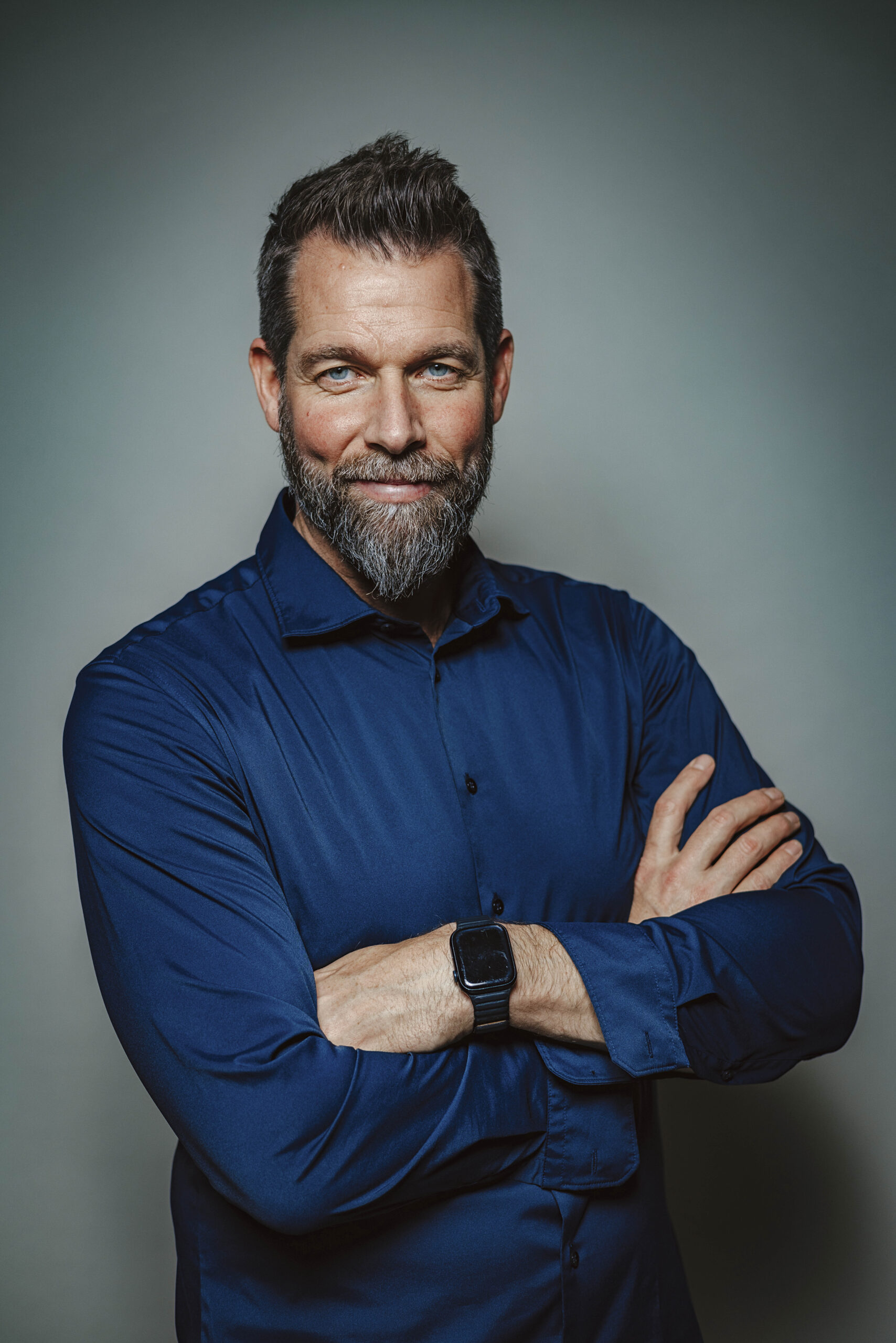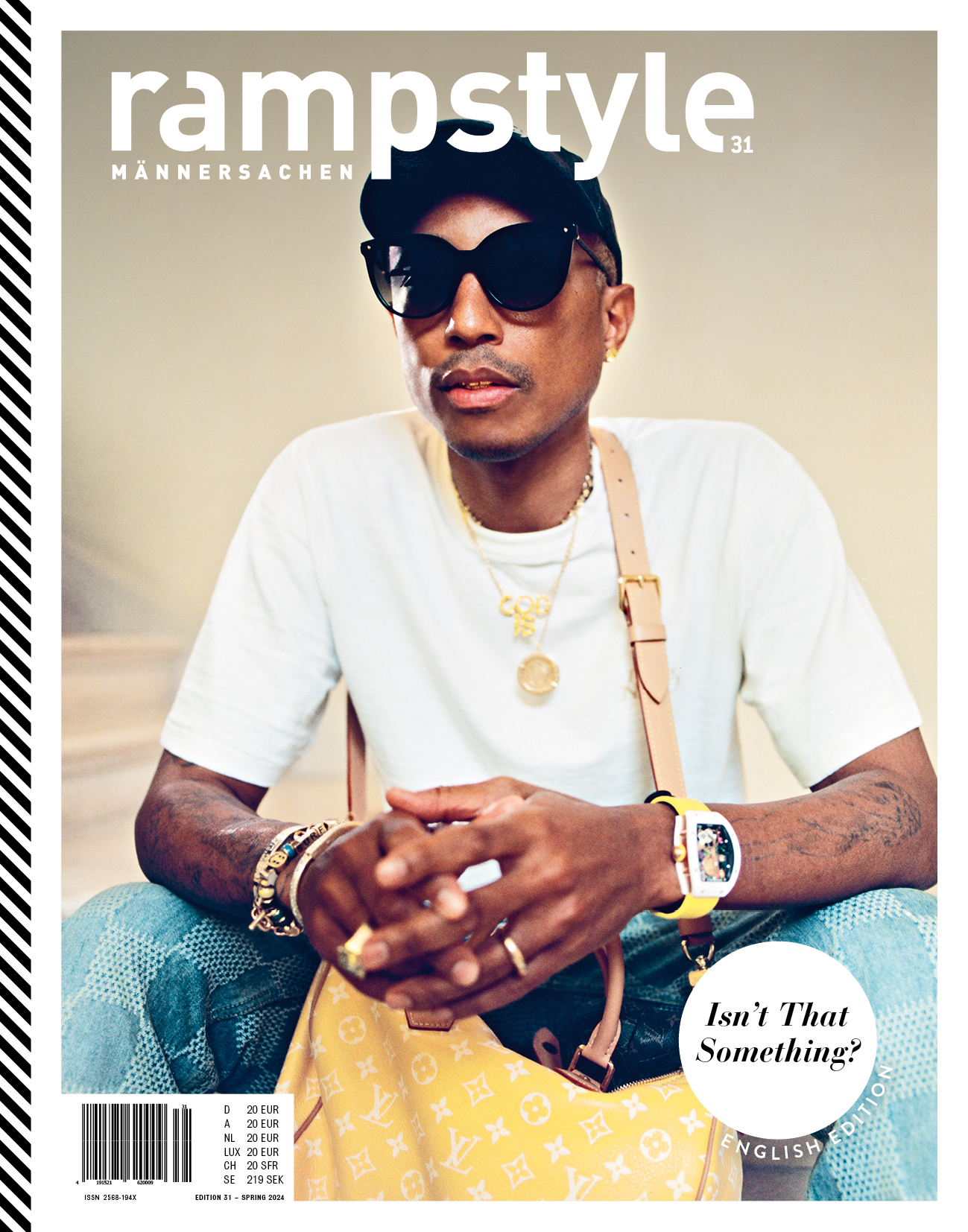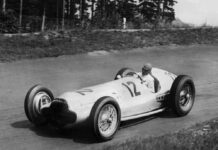Bodo Janssen’s life has been anything but uneventful, to put it mildly. The son of a millionaire businessman, he was kidnapped and held for ransom as a young man and later became a results-driven manager and overachiever. Despite it all, however, the CEO of the Upstalsboom hotel group told us that he really enjoys being surprised by life.
In part because he understands how to transform a crisis into something positive.

Mr. Janssen, who would you say you are?
I don’t know exactly, but I try to find out more about myself every day just through my encounters with other people. I’m a different person to all the people I know and meet – a father to my children, a husband to my wife, a boss to my employees or just someone that the other person likes or doesn’t like. I am many. And I’m a person who loves surprises.
Where does that come from?
I like to be surprised by life. Because of everything that’s happened to me, I’ve decided to see life and everything it brings me as an opportunity to grow as a person.
What motivates you?
Helping others to become stronger, empowering them. That’s what I get up for every day. Forty years from now, I see myself as a grandfather sitting in my Frisian house by the lake with my grandchildren on my lap, telling them bedtime stories of happy people. I know I can’t make people be happy, but as an entrepreneur and as a family man, I do have an influence on helping people discover what makes them happy. I try to experience a story every day that I can share later on down the line.
In 2010 you received an unpleasant surprise when a staff survey found that your employees weren’t happy with you as their boss. How did you respond?
That was a real wake-up call. I obviously hadn’t seen things clearly before, but through rose-colored glasses. I didn’t realize that my employees weren’t happy. But I decided to accept their feedback. I had already made the experience that you have to face up to the truth, that anything else would only make things worse. I couldn’t simply hand the company back to my father, who had founded it. He died in a plane crash in 2007 – another unpleasant surprise in my life. So faced with that staff survey, it was clear to me that being scared wasn’t good and that I couldn’t hide from the facts. Flight was not an option. The third alternative we have when faced with danger is to fight.
So you decided to fight?
Yes, but what I did was to fight for something, not against something. So I accepted the facts and told my employees: “Dear employees, if you see it that way, then there must be something to it.” And then I was in for another surprise: I was met with goodwill. They were open and interested in finding a solution together.
The result was a real cultural change. How did you approach that?
The first step was to recognize the situation for what it was. I then made the decision that I wanted to change something. That was the foundation on which the change could be built. Then I went to a monastery.
Why a monastery?
Because I didn’t know the answers to the questions that my employees had about leadership. I couldn’t find any books with answers either. So it was “Last exit to Würzburg”. I met my mentor, Father Anselm Grün, at Münsterschwarzach Abbey near Würzburg. He guided me on my path to leading myself and others by transforming myself. He told me: “Only someone who can lead themselves can lead others.”
Did that also change things at your company, Upstalsboom?
The concept changed, but we respected our tradition while remaining determined to grow. Much of what makes us special is based on our Frisian freedom. That hasn’t changed. What has changed is the idea that people are a means to an economic end. Today I know that the employee is not there for the company’s benefit. Actually, it’s up to the company and me in my role as an entrepreneur to make sure that the people who work for me are better off and more empowered than before.
What does that mean?
That means that people go home in the evening feeling better about themselves than when they arrived in the morning. That their work inspires confidence and personal responsibility. I have brought the concept of eudaimonia into the company. In ethics, eudaimonia refers to inner harmony regardless of the external factors. When our guests say they feel a sense of lightness at our hotels, I’m delighted. That happens when you can free yourself inwardly from stress, tension and exertion. And to achieve this, you have to ask yourself how leadership, organization and communication can strengthen and empower others.
You write about this in one of your books, where you refer to this approach as “new leadership”. What exactly is that?
How you lead depends on your own intentions. Someone who wants to empower others leads differently than someone who wants to increase their own profits. Then there’s the context in which we operate. In times where planning is no longer possible, leadership has to adapt. It also depends on the people you lead. For me, “new leadership” means adapting leadership to the prevailing circumstances and the spirit of the times.
How do you get your employees to internalize this attitude?
The art of leadership is to support people without lecturing them. Internalizing is a good term for this. It means nothing more than reflecting on yourself, reflecting on the answer to the question: What is important to me as a person? This is the core process in our company: helping people to remember who they are. What is worth getting up for every day? What are my values? What is important to me? On the basis of these insights, you have to find the tasks that suit you.
How does that work?
Through experience. Experience shapes our character. We take our apprentices on trips to Kilimanjaro, Rwanda or the Arctic. We engage in social projects and meet people there who we can learn a lot from. My aim is to encourage people to take risks. And to have an experience that brings us closer to the answer as to what matters to us.
How is your recruiting going at the moment? After all, this is one of the most difficult tasks in the hotel industry right now.
I see things differently. The recruiting situation can always change, but in general we don’t have to go out of our way to find people who want to work with us.
And how is your approach received in the places where you operate your hotels?
I think that our approach is well received. The indicator for me is the bar. The locals on the island of Föhr, for example, regularly come to the hotel bar to have a drink. That’s a good sign. We asked questions and listened to what people had to say. The Low German way of life unites people along the whole coast with the rough sea and rugged landscape. The geographical and linguistic connections create a good platform for getting on well with one another.
What exactly are the origins of the name Upstalsboom?
The word is Low German. The Upstalsboom is a place in the heart of East Frisia where the Frisian chieftains met eight hundred years ago. They would meet there once a year on May 1 to confer about the freedom of the Frisians. The Upstalsboom is the tree to which the chieftains tied their horses. You could say that this Frisian idea of freedom unites us and has its origins in the Upstalsboom.
Let’s talk briefly about your abduction in 1998, when you were twenty-four. How did you cope with that afterwards?
That was a moment in my life that through reflection became a turning point. The monks call it ruminatio, ruminating and regurgitating and reflecting. I ruminated on what I had experienced. My motive was to grow from that experience. Some people fall apart in a crisis, while others grow from it. I make the decision myself as to the intention with which I go into reflection. Twelve years after the kidnapping, I was sitting in the monastery, reflecting back and using the time to ask myself what it had all been good for. Turns out it was good for finding answers to the important questions in life. Realizing this helped me turn my life around.
Where do you find the strength for all that?
There are people who find this strength within themselves. And there are people who need someone to encourage them. Father Anselm Grün encouraged me to find the answers to life’s important questions even in times of crisis. He says, “In times of crisis, we are closest to ourselves.” He also likes to quote the twelfth-century saint Hildegard of Bingen, who said, “The art of becoming human is to make pearls out of our wounds.” This encouraged me to grow by confronting the bad. Today I no longer see the negative. To put it bluntly, it’s like putting manure on the field so that something grows.
What role does writing books play for you?
A fundamental role. I discovered writing during my time in the monastery. The lectio and ominatio are about the silence that precedes writing. The insight that arises in this silence is manifested through writing. That is a learning effect. For me, writing means growing and appreciating what I have experienced and what I would have squandered without reflection. Writing is the opposite of waste. It is appreciation for life.
How much room do you give to writing?
I write every day. I get up every morning at 4:15 a.m. and first sit in silence. Then I read, sometimes from texts that are two thousand years old, sometimes from more modern texts. Then I go back into silence and see what resonance arises in me from what I have read. I write as soon as something resonates. That’s when I’m reminded of something I’ve already experienced before and suddenly have a realization about it.
And how much do you write?
About three to five thousand characters a day. It’s a hodgepodge from which I recognize trends, add to them, round them off. Then the next book is finished, long before the previous book has even been published. This year, however, I’ve decided to let books be books for a while and spend my spring mornings out in nature.
What does your daily routine look like after that?
After my silent meditation, I go to my wife’s bedside with a cup of coffee and the newspaper. She drinks her coffee, and I drink my green tea. We read the newspaper together, exchange ideas, then we go downstairs before the children slowly emerge from their rooms. We have breakfast and everyone gets ready for the day. The children leave the house at 7:30 and I’m either back in my study, in the office or on a business trip from 8:00 onwards. That goes on until lunchtime. It’s important for me to be at home for lunch because I like to eat at home and I need a short nap. At 2:30 p.m. I continue working until 6 p.m. Then I finish the working day and it’s time for the family again or to go out into nature.
Where do you spend your own holidays?
In the last ten or fifteen years, I’ve only been to Germany and Austria, though sometimes I go further abroad on business. We’ve often been to the island of Borkum in the past. We also go on vacation to Föhr and stay in the Upstalsboom residences. But we also like to stay at home because we are mostly self-sufficient and have discovered that the tomatoes can’t stand it if we’re away for two weeks at a time That makes for a whole lot more work after the holiday.
What have been the nicest surprises in your life?
The number of positive surprises increased significantly the moment I decided to turn expectation into hope. Since I no longer expect anything, I’m constantly surprised by life. Expectations can be disappointed, but hope never is. I hope a lot. That frees me a little from the way I think things should be.
Is there one surprise in particular that sticks out?
I remember a very nice surprise at Münsterschwarzach Abbey. A few years ago, Father Isaiah came by for a morning ritual at breakfast. He said, “I would like to guide you into the day. Close your eyes and let the sun rise in your heart.” He invited us to do this standing at the table over breakfast. He then said, “The sun that has now arisen in you shines on everyone you meet today.” Three years later, I was sitting in the same breakfast room with participants in a seminar. Father Isaiah came in to greet us and wondered why we all had such bright eyes. I told him that I had just done the same ritual with the participants that he had taught me three years earlier. At that moment, he beamed with surprise. He realized that he was responsible for the fact that twenty people were sitting there with a radiant glow in their eyes. Seeing that look of joyous surprise on his face touched me deeply.
One last question. What are doing immediately after our chat?
I’m meeting up with a good friend and we’re going for a walk with our dogs. We’ll be outside until dark, being in and observing nature.
Interview: Michael Köckritz for ramp
ramp #31 The Big Easy

Focusing on the essentials, blocking out everything else… If you’re focused, you’ve already mastered one important key skill. In our multimodal world, focus is, unfortunately, a rather limited resource. In particularly focused moments, we forget all about time. But do we run the risk of developing tunnel vision? Does focus lose its power over time? Do we become habituated? Far from it. Unexpected surprises? Bring ‘em on! Find out more










